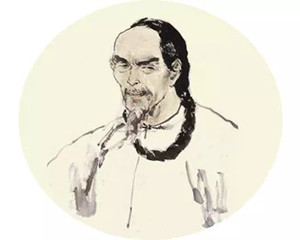(单词翻译:单击)
龚自珍的这首《送夏进士序》,友人将要担任吏职,赠序以鼓励,用皇上也自称为书生的事实来鼓励友人。要友人不自卑书生的称呼,不怕嘲笑,保持书生的本色而不混同于俗吏之流。"天下事,舍书生无可属"这样的话,出自具有进步思想和热情的龚自珍之口,是鼓励他人,又何尝不是自信自勉!

龚自珍·《送夏进士序》
乾隆中,大吏有不悦其属员者,上询之,以书生对。上曰:"是胡害?朕亦一书生也。"大吏悚服。呜呼,大哉斯言!是其炳六籍、训万祀矣。
嘉庆二十二年春,吾杭夏进士之京师,将铨县令,纡道别余海上。相与语,益进,啐然愉,谡然清,论三千年史事,意见或合或否,辄哈然以欢。余曰:"是书生,非俗吏。"海上之人以及乡之人皆曰:"非俗吏!"之京师,京师贵人长者识余者,皆识进士,亦必曰非俗吏也。
虽然,固微窥君,君若惧人之訾其书生者,又若有所讳夫书生者,暴于声音笑貌焉。天下事,舍书生无可属。真书生又寡,有一于是,而惧人之訾已而讳之耶?且如君者,虽百人訾之,万人訾之,啮指而自誓不为书生,以喙自卫,哓哓然力辩其非书生,其终能肖俗吏之所为也哉?为之而不肖愈见其拙回护其拙势必书生与俗吏两无所据而后已。噫!以书生之声音笑貌,加之以拙,济之以回护,终之以失所据。果尔,则进士之为政也,病矣!
新妇三日,知其所自育;新官三日,知其所与。予识进士十年,既庆其禄之及,于吾里有光,而又恐其信道之不笃,行且一前而一却也。于其行,恭述圣训,以附古者朋友赠行之义。
On the Departure of the Jinshi Scholar Xia
Gong Zizhen
In the mid-Qianlong period, there was a high official who was dissatisfied with one of his subordinates. When the emperor asked him why, the official replied that the man was just a bookman. The emperor said, "What is wrong with being a bookman? I am one myself." The official was stunned. Ah! What a marvelous pronouncement! Outshining all the six classics, it will be treasured for generations to come.
In the spring of the twenty-second year of Jiaqing [1817] the jinshi scholar Xia Huang who came from my hometown to Hangzhou, made a detour to Shanghai to bid me farewell while on his way to the capital to receive his appointment as County Magistrate. As we talked, I found that he had become more advanced in his learning than before. This was reflected in his appearance—he looked pleasant and refined. In our discussion of the events of three thousand years of Chinese history we sometimes agreed and sometimes did not, but always we exchanged smiles of appreciation. I remarked, "This is a true bookman, not a common official." People in Shanghai and the country folk also said that he was not a common official. When he arrived in the capital, the eminent men with whom I am acquainted all got to know Xia as well and all concurred that he was not a common official.
Though this was the case, watching him closely, I detected that he harbored fears that others would despise him for being a bookman, and that he was uncomfortable about being called a bookman. All this is revealed in his tone and his mien. Affairs of state should be entrusted to none other than bookmen. True bookmen are few, and here is one—why then should he fear the disdain of others, or resent being called a bookman? Even if a man like Xia, when faced with the accusation of a hundred or even ten thousand people, were to bit his finger to swear that he is no bookman and defend himself vigorously, he would never be able to behave like a common official. If he tries and yet falls short, the more inept will he appear. Should he defend his ineptitude, he would lack conviction as either a bookman or a common official. Alas. Compounding ineptitude with the tone and deportment of a bookman and then going so far as to defend himself, he would end by losing his ground. If it were truly to come to this, what a handicap it would be to his ability to perform the duties of his office!
Within three days after her wedding, we know whether a bride is capable of running the household; within three days of taking up his post, we know whether an official is capable of carrying out his duties. I have known Scholar Xia for ten year. I am very happy that he had honored our hometown by his appointment and yet I feared that he would not be firm in the faith, that he might hesitate on the way forward. And so before he left I respectfully recited the emperor's words to him, in line with that charge given us by the ancients to proffer a few words to a friend as a parting gift.
(Janice Wickeri 译)
更多精品翻译素材,敬请关注可可英语。


